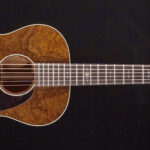Electric guitars have powered music for decades, from the raw energy of rock and roll to the soulful sounds of blues and beyond. If you’re a beginner eager to plug in and play, the good news is you don’t need to break the bank to get started. Finding an Electric Guitar Cheap enough for a beginner is absolutely achievable, and this guide will show you how to find the perfect affordable instrument to kickstart your musical journey.
Electric guitars have a rich history. While they exploded in popularity during the rock ‘n’ roll era, their origins trace back to the early 1930s. As big band orchestras grew, particularly with loud brass sections, the need for amplified guitars became clear. Early pioneers experimented with hollow archtop acoustic guitars fitted with electromagnetic transducers to boost their volume in jazz ensembles. By 1932, commercially available electric guitars were a reality. Brands like Rickenbacker, Dobro, National, Epiphone, and Gibson were among the first to bring electric guitars to the market, forever changing the sound of music.
Gibson’s first production electric guitar, the ES-150, launched in 1936, marked a significant milestone. The “ES” stood for “Electric Spanish,” and “150” represented its $150 price tag – demonstrating that even early electric guitars could be relatively accessible. The ES-150, featuring the “Charlie Christian” pickup, became popular among jazz guitarists, but early models still had limitations in balanced string volume. Despite these initial hurdles, the electric guitar continued to evolve, becoming a cornerstone of rock, blues, and countless other musical genres.
What Makes an Electric Guitar “Cheap” and Why It’s Great for Beginners?
When we talk about an electric guitar cheap, we’re generally referring to instruments designed to be affordable, especially for beginners. These guitars often utilize cost-effective materials and manufacturing processes without sacrificing playability and sound quality to a degree that hinders learning. Here’s why opting for a cheap electric guitar is a smart move for beginners:
- Lower Initial Investment: Learning guitar requires dedication and practice. A cheap electric guitar minimizes the initial financial risk, allowing you to explore your interest without a significant investment upfront.
- Focus on Learning Fundamentals: Beginner guitars are designed to be playable and functional, providing everything you need to learn basic techniques without overwhelming complexity or features you won’t yet utilize.
- Upgrade Later as Skills Grow: As your skills progress and your ear develops, you can always upgrade to a higher-end instrument that better suits your evolving needs and preferences. Starting with a cheap electric guitar doesn’t limit your future musical journey.
Types of Affordable Electric Guitars
Just like their more expensive counterparts, cheap electric guitars come in various body styles, each offering unique tonal characteristics:
Solid Body: The Workhorse for Beginners
Solid-body guitars are constructed from solid wood, with routed cavities only for electronics. This design contributes to greater sustain and a focused tone, making them incredibly versatile and popular, especially in the cheap electric guitar category. Famous solid-body designs include the Fender Stratocaster and Telecaster, and the Gibson Les Paul and SG. Affordable versions of these iconic shapes are readily available from brands like Squier (Fender’s budget-friendly brand) and Epiphone (Gibson’s equivalent), offering beginners classic looks and sounds at accessible prices.
Semi-Hollowbody: Warmth and Versatility on a Budget
Semi-hollowbody guitars blend elements of solid and hollow bodies. They feature a solid center block with hollow wings, creating a warmer, more resonant tone than solid-body guitars. While less common in the absolute cheapest electric guitar range, affordable semi-hollow options exist and are excellent for genres like blues, jazz, and indie rock, offering a wider range of tonal colors.
Full Hollowbody: Vintage Vibes, Less Common for Entry-Level
Full hollow-body guitars are entirely hollow, offering the warmest and most resonant tone, often associated with jazz and vintage blues. While classic “jazzbox” hollow bodies can be expensive, some cheap electric guitar options in this style are available, though less frequent for absolute beginners primarily focused on rock or general genres. Hollowbodies can be more prone to feedback at higher volumes, which is something to consider for beginners.
Top Brands for Cheap Electric Guitars: Quality and Affordability
Several brands consistently deliver quality cheap electric guitars perfect for beginners:
- Squier: By Fender, Squier offers officially licensed versions of Fender’s legendary Stratocaster, Telecaster, and Jazzmaster models at significantly lower prices. Squier guitars are renowned for their playability and value, making them top recommendations for beginners.
- Epiphone: Similar to Squier, Epiphone is owned by Gibson and produces affordable versions of Gibson icons like the Les Paul and SG. Epiphone guitars provide a taste of Gibson’s classic rock sound without the premium price tag.
- Ibanez: Ibanez is known for its diverse range of guitars, including excellent cheap electric guitar options, particularly in their GIO series. Ibanez guitars often feature thinner necks, which many beginners find comfortable, and are popular for rock and metal styles.
- Yamaha: Yamaha offers a range of reliable and well-built cheap electric guitars known for their quality control and consistent performance. Yamaha guitars are a solid choice for beginners seeking a dependable instrument.
Choosing Your First Cheap Electric Guitar: Key Considerations
When selecting your electric guitar cheap, focus on these essential factors:
- Playability: The guitar should be comfortable to hold and play. Check the neck profile – thinner necks are often easier for beginners. Ensure the action (string height) isn’t too high, making pressing down strings difficult.
- Sound: Even cheap electric guitars can sound good. Consider the type of music you want to play. For rock and general styles, solid-body guitars are versatile. Listen to sound samples online if possible.
- Components: Pay attention to the pickups (they convert string vibrations into sound) and hardware (tuning pegs, bridge). While cheap electric guitars use more affordable components, reputable brands ensure decent quality for the price range.
- Reviews and Recommendations: Read online reviews and beginner guitar guides. Guitar store staff can also offer valuable advice based on your needs and budget.
- Budget: Determine your budget and stick to it. Remember to factor in essential accessories like an amplifier, cable, picks, and a tuner – often available in affordable beginner packs.
Where to Find Cheap Electric Guitars
- Online Retailers: Websites like Guitar Center, Sweetwater, and Amazon offer a vast selection of cheap electric guitars with detailed descriptions and customer reviews.
- Local Guitar Stores: Visiting local music stores allows you to try out guitars in person, get expert advice, and sometimes find used instruments that offer even greater value.
- Used Market: Exploring used guitars on platforms like Craigslist or Facebook Marketplace can uncover excellent deals on cheap electric guitars in good condition.
Conclusion: Start Your Guitar Journey Affordably
Learning electric guitar is an exciting and rewarding experience, and you absolutely don’t need to spend a fortune to begin. Numerous electric guitars cheap enough for beginners provide excellent playability, decent sound, and reliable quality from reputable brands. By focusing on playability, sound that suits your musical interests, and considering brands like Squier, Epiphone, Ibanez, and Yamaha, you can confidently choose a cheap electric guitar that will inspire you to learn and play for years to come. So, plug in, turn it up, and start your musical adventure today!


